The Content and Link Building Strategies Brett Helling Used to Grow Ridester to Over 1 Million Visitors a Month
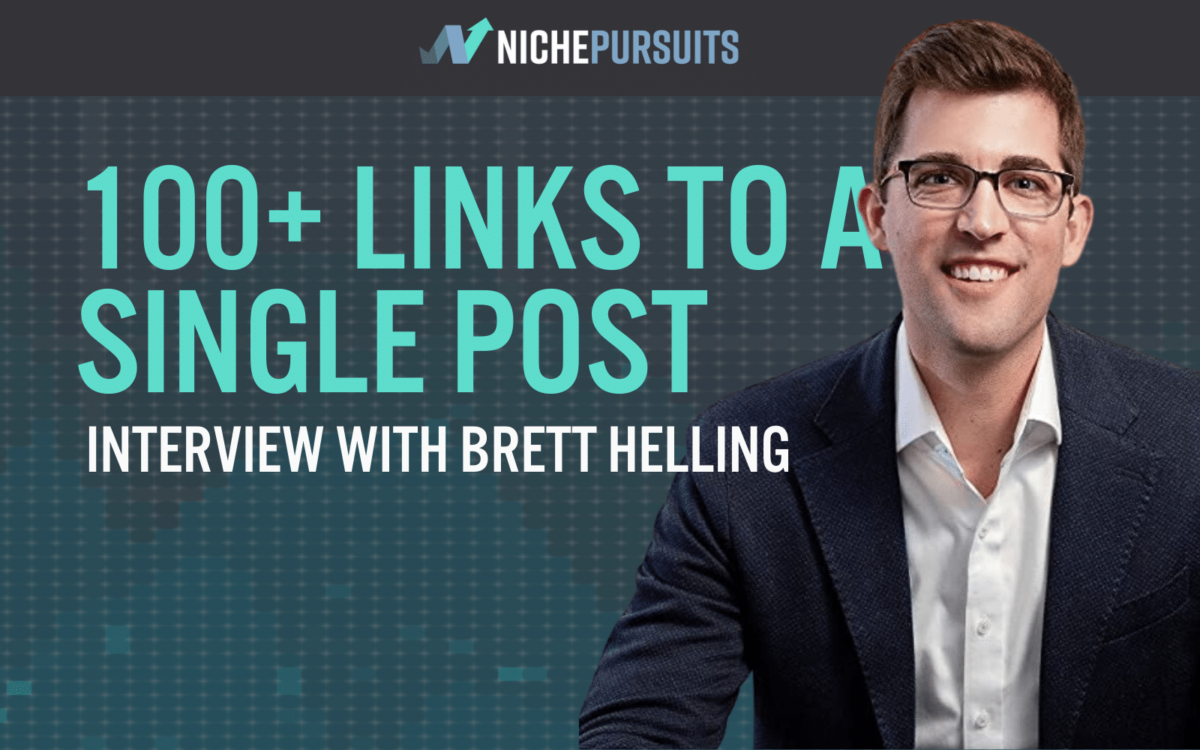
When you buy something through one of the links on our site, we may earn an affiliate commission.
Brett Helling has built and run multiple successful websites.
His largest site, in the ridesharing niche, received over 1.5 million views per month at its peak and was a go-to resource for that community.
Brett's sites are a great example of being in the right niche at the right time. As ridesharing was becoming mainstream, and both drivers and riders were seeking information, Ridester was able to answer their questions.
Uber and Lyft were battling to recruit drivers, and it wasn't uncommon for referral commissions to reach $2,500 for each driver. When Ridester was the number one resource for rideshare drivers those commissions can really add up.
After additional competition came into the market as well as the initial demand for ridesharing cooled off, Ridester has seen a roller coaster of traffic changes.
We're glad he can share a little bit about his journey and what he's learned along the way. The way he created a piece of content that got over 100 links from some of the strongest sites in the world is one of the most interesting bits. Enjoy!
Contents
- Who are you and what is your background?
- How did you start making money online?
- Why did you start Gigworker.com?
- How have you grown your business?
- What have you learned through building your websites?
- What has been your most successful link building campaign?
- How did you get the reporters to share your survey?
- How long did it take to see success with Ridester.com?
- What was the largest factor that took you to over 1 Million Monthly Visitors?
- Why did the site see a decline?
- What tools do you use for your websites?
- What is your philosophy for working on websites?
- What keeps you going when things are tough?
- Advice for new online entrepreneurs
Who are you and what is your background?

Of these websites, the one that’s growing the fastest is Gigworker.com, a comprehensive resource for those looking to start and thrive in the gig economy.
When I’m not running my websites, I’m also a marketing and SEO consultant for an ad agency in Omaha, Nebraska.
My work is my hobby. Believe it or not, what was once a side hustle is now my full-time job.
Over the years, I’ve been able to turn a website concept into a full-time job that allows me to live life on my own terms – traveling and seeing the world.
How did you start making money online?
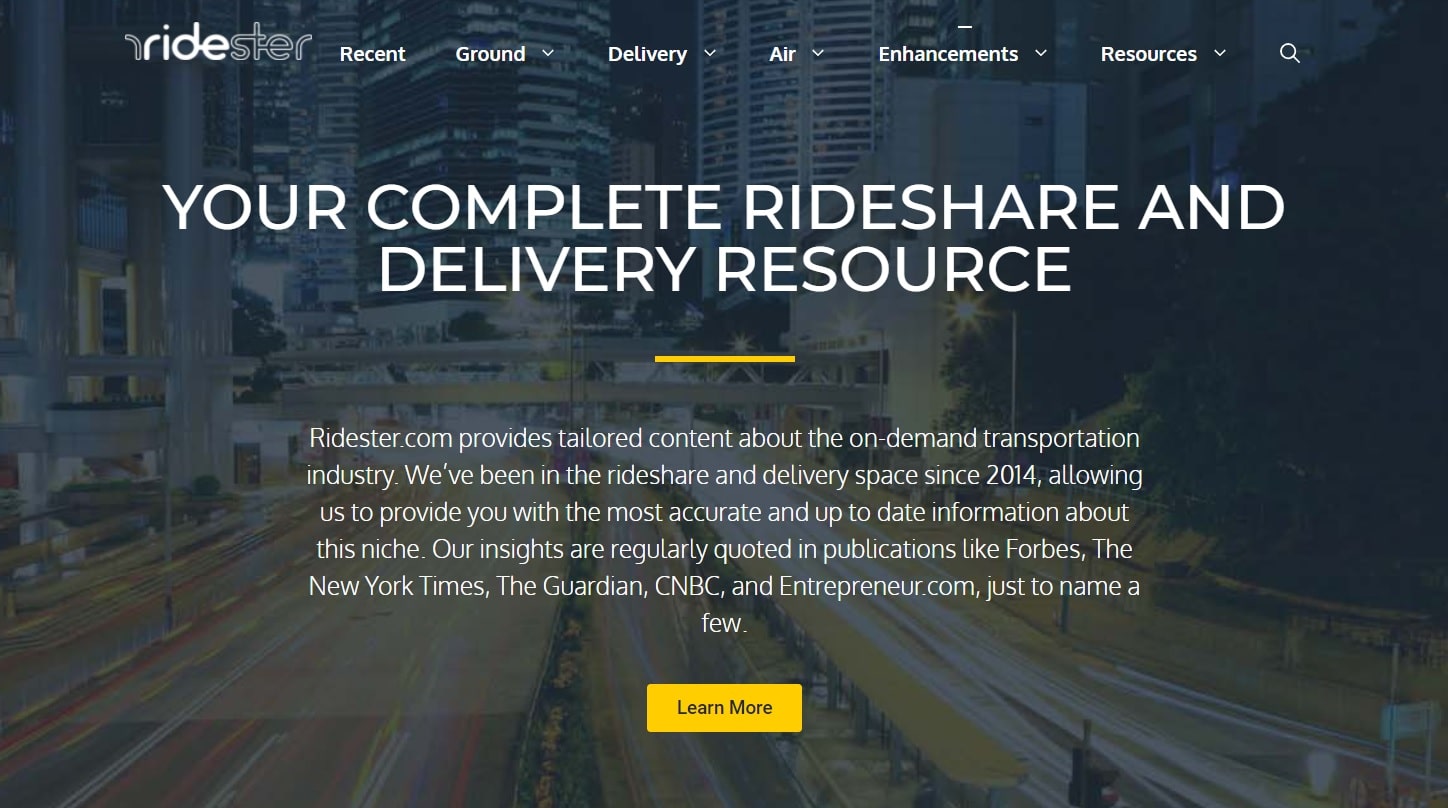
I realized the power of online marketing and niche websites after starting a website about Uber driving.
When Uber first came to Omaha, I signed up as a driver after hearing about the promotions the company was running. After watching two training videos, they let me loose on the streets to give rides. It only took me a day to realize that I had no idea what I was doing.
Unfortunately, there wasn’t much content on the internet about ridesharing at the time, simply because the service was so new. So I started a personal blog of my own to share the ins and outs of driving with other Uber drivers.
The site I started is now Ridester.com.
After a few months of running the site, I began looking into ways to grow the traffic. I realized that the more people came to my site, the more affiliate commissions and ad revenue I would make. This began my journey into digital marketing.
Once I really began producing content based on data, the site grew from 250,000 people/month to over 1.5 million/month within a year.
However, I could never really figure out how to structure Ridester. I tried building all sorts of features but none really took off. I realized that at the core, people wanted information about ridesharing.
After attempting to launch a course and failing, I realized that I needed to stick to what I was good at – writing content.
Why did you start Gigworker.com?
Eventually, I realized that I could only write so much content about Ridesharing. So I expanded the site from that niche by starting another website to provide information about the gig economy as a whole.
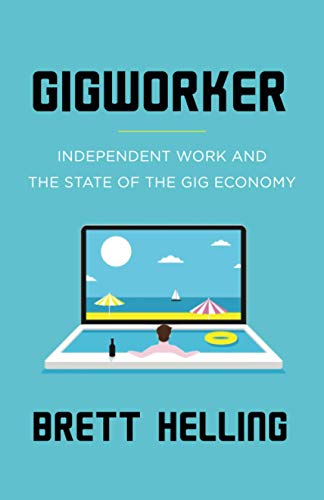
And, because I did so much research when starting that site, I was also able to repurposes much of that content and write and publish a book about the gig economy.
It's titled ‘Gigworker' and it is now available on Amazon.
After diversifying with Gigworker.com, I’ve diversified even further by acquiring or starting 9 other websites in various verticals and niches.
How have you grown your business?
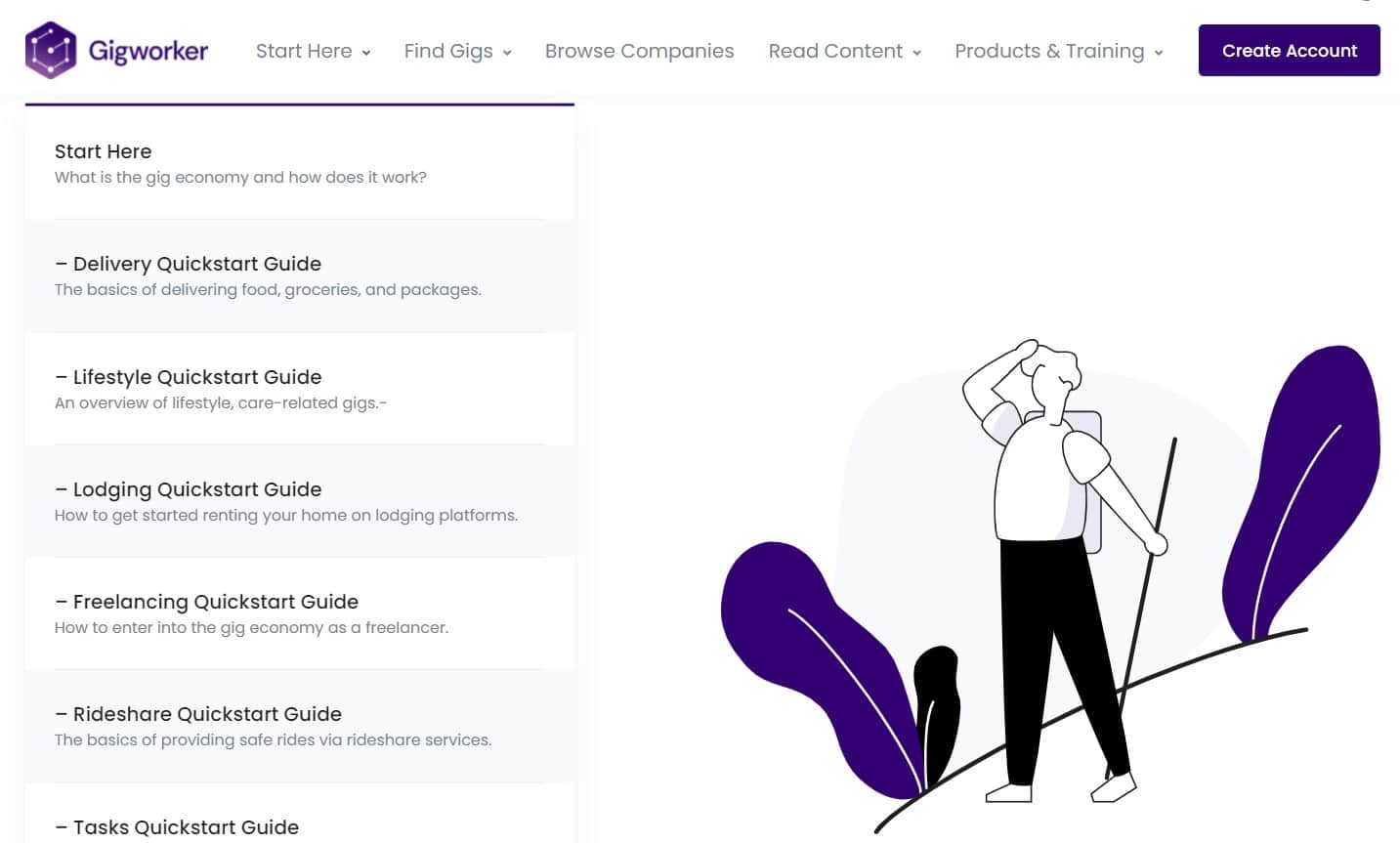
The gig economy has been the most instrumental part of my businesses’ success.
I run a team of independent contractors to monitor, manage, and grow my portfolio. I only have so much time in the day, so outsourcing this work to my team allows me to take on as much as I do. If I tried to do this all myself, I would fail.
Data also helps me grow my business. Almost every decision I make is driven by data, which allows me to strategically grow and expand my business – not just guess what I think would work well.
Taking that one step further, the data helps me to assess my decisions once I make them, allowing me to scale something that works or pivot if it doesn’t.
Speaking from an operational perspective, I’m a huge SEO guy.
I understand the dangers of having only one traffic source, but my main focus is organic SEO. I believe that if you get the traffic, and have a digital asset worth sharing, your users will do the hard work in promoting your content. That type of thinking allows me to focus on what I’m good at and then leave the rest to my users.
One thing I stay away from is PPC. Because the majority of my revenue comes from ad networks and affiliate commissions, the PPC model isn’t that appealing to me. I’ve tried it out for ad arbitrage, but unless I’m selling a high-dollar course or product, the ad spend isn’t really worth the money to me.
What have you learned through building your websites?
My time building my online business has taught me a few lessons I wish I would have known when I first started out.
First, stick to what you’re good at.
It’s easy as a business owner to try to learn everything. However, doing so limits the ability to focus on what drives the most results for the business. There are outsourced agencies, teams, or freelancers for nearly everything. Use these wisely and you will scale your business like you wouldn’t believe.
Secondly, diversification is underrated.
I’ve learned that no matter how successful an online business might seem, nothing lasts forever. As I like to say, hope for the best but plan for the worst. It only takes one algorithm update for a website to go under, so treating your business like it could collapse allows you to properly react if you are negatively impacted by something.
What has been your most successful link building campaign?
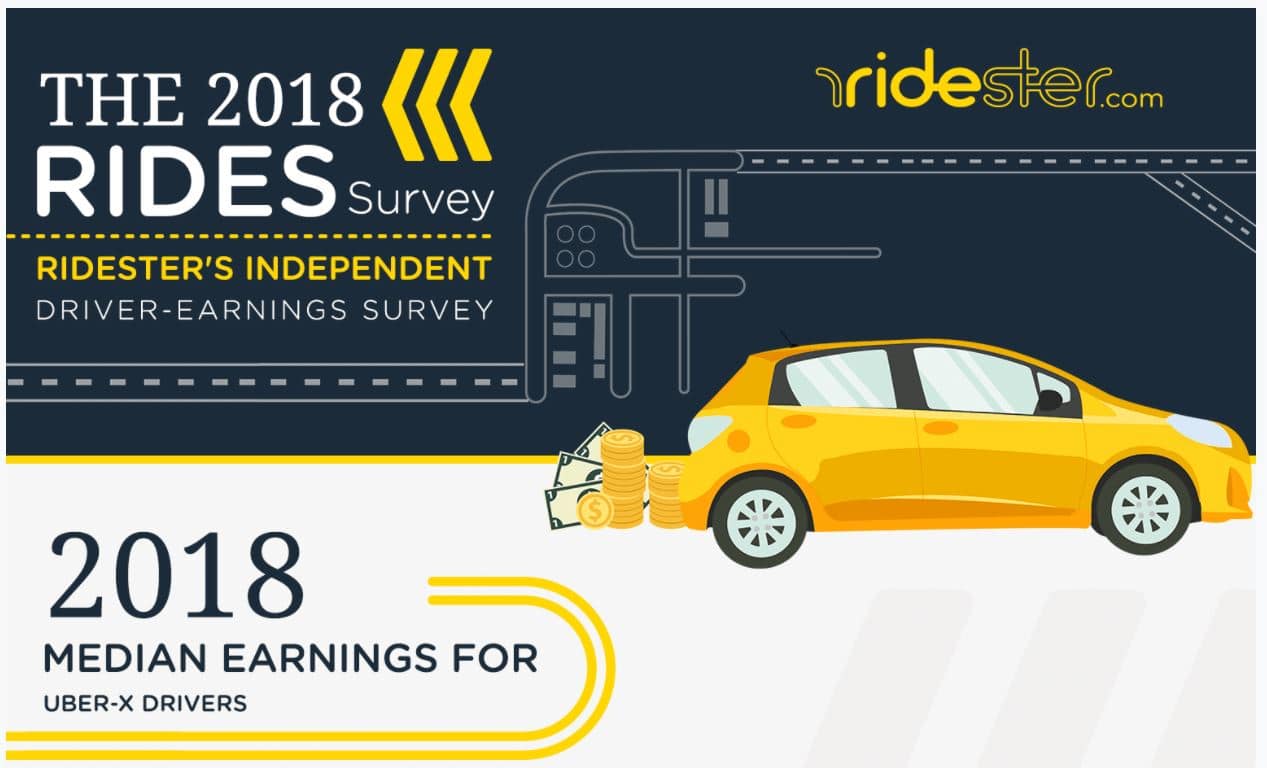
One of the most successful outreach campaigns I’ve run was a survey I put together for Ridester.com.
The survey was simple: find out how much Uber drivers actually made, compare that to what Uber claims they made, and then include some interesting findings and our thoughts around the topic.
We polled thousands of rideshare drivers and found that they made significantly less than Uber claimed they were making at the time of publication. I had a gut feeling that our findings would make for a very interesting news story, so I began reaching out to reporters and pitching my story.
After a few weeks of pitching the story to reporters, one went for it.
The story ended up getting featured in Recode in October of 2018 and went viral within days of publication. Once Recode picked up the story, we were featured in many more news outlets.
Here is just a sample of links the survey picked up.
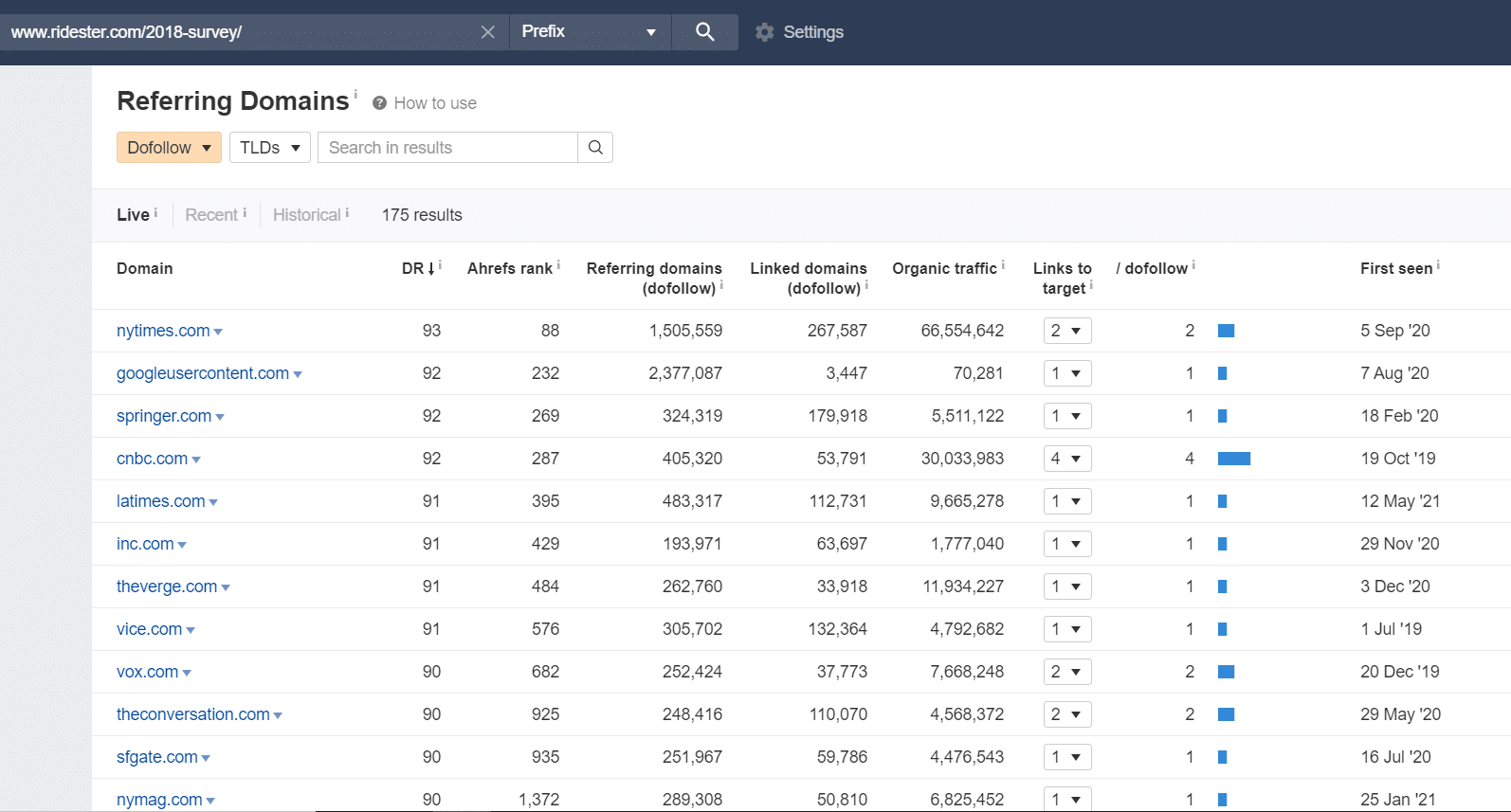
All up, it has received 175 links – though not all of them are excellent.
This was the start of organic traffic growth.

The links from this campaign allowed us to achieve a very high level of growth in terms of traffic and revenue.
We reached out to journalists manually.
We researched the tech industry for months, and in the process hand-curated a list of journalists that might be interested in the topic. Before we even completed the survey, we started reaching out to journalists asking if they would be interested. Their feedback was actually very essential in helping us craft a pitch when it came time to crunch the data.
After we collected the survey responses and crunched the data, our team created high-quality infographics and other graphic elements that allowed us to present the data in an easy-to-read format.
Our team began emailing the contacts that we collected one by one. A contact at Recode showed interest in the story, and after weeks of finessing the pitch/story, they published an article featuring our story.
The article ended up becoming one of the most popular articles of the month, with thousands of shares.
From there, the media flywheel engaged, and publication after publication began to mention us – with a link back to the survey.
How long did it take to see success with Ridester.com?
My success in digital marketing didn’t happen overnight.
I started a content website about ridesharing, but then actually purchased Ridester.com from Flippa and merged the site I started with the existing Ridester.com site.
Because Ridester.com had an existing brand and high-power links from media outlets like Forbes, the content I put on the site ranked fairly quickly. This then allowed me to earn money on affiliate commissions and ads. However, the process still took about 12 months before seeing meaningful revenue.
While I was in the right place at the right time with Ridester, many of the websites in my portfolio are still growing. I’ve acquired some over 6 months ago and they have yet to see substantial increases in traffic and revenue.
I’m okay with this because I know that to see long-term success with a niche website, you need both patience and time. Eventually, with enough work, the results will come.
What was the largest factor that took you to over 1 Million Monthly Visitors?
I directly correlate the links we gained as a result of the survey to the increase in:
- Search traffic
- Rankings
- Overall credibility for our brand
However, we couldn't have done that without taking a targeted approach to content production.
I spent months researching content topics that would resonate with our audience, then created a content plan that allowed us to systematically and efficiently produce content for over 12 months. The articles we produced for our content plan were well-researched.
To make our list, each post topic had to have a high search volume, moderate difficulty, and be highly relevant to the rideshare industry. Being in a new niche also helped us a ton. At the time, the industry was very new and there wasn't much information or content written on the niche. To add to that, very few competitors were writing about the space, meaning whatever we published ranked pretty quickly – and very well.
Add the links to that content strategy and you can see how we very quickly took over the space.
Why did the site see a decline?
Since becoming a key authority in the rideshare space, we have faced tons of setbacks.
As ridesharing became more popular, a lot of the bigger companies in the space started using the same content strategy as I did.
For example, Uber pretty much replicated my content strategy post by post – including site structure, article topics, and more.
They saw how much they were paying me in affiliate bonuses and, I assume, thought that if they could rank for the same topics, they could instead take that traffic and pay me less. It worked, and traffic to their website has increased steadily since they started.
Secondly, tons of the big media giants also started copying my strategy.
Publications like the Wall Street Journal, The Points Guy, and Business Insider have since outranked me – simply due to their immense audiences, domain authorities, and huge editorial teams. Luckily, I have topical relevance that they really don't have, but at the end of the day, I can only do so much when going up against such huge publications.
Lastly, COVID-19 pretty much decimated the rideshare industry overnight.
Since March 11, when the lockdowns in the United States started, my traffic slowly decreased, to the point where I was only getting around 200,000 unique visitors per month. In the meantime, Google has changed its algorithm multiple times, so I'm holding out with the hope that things will stabilize and traffic will return.
That's just the nature of the game, unfortunately.
What tools do you use for your websites?
My favorite tools are:
- Ahrefs for keyword and content research
- Semrush for technical audits and tracking
- Link Whisper for internal links
- Clearscope for content optimizations
These tools allow me to quickly move through tasks and bring a ton of efficiency to important activities that would otherwise take a long time to complete.
What is your philosophy for working on websites?
My philosophy when growing an online business goes back to an age-old adage: slow and steady wins the race.
I have strayed from that philosophy many times, and almost every time I’ve ended up learning from my mistake. I know what works, and it’s been proven. When I stick to what I know works, the results come.
Of course, it’s very dangerous to assume that what’s worked in the past will continue to work moving forward.
Keeping that in mind, what is working for me is evolving constantly, but the key idea is to stick to what has worked, pivot when needed, and not try to reinvent the wheel every time I find a new idea or strategy.
What keeps you going when things are tough?
When things get tough, I try to do two things.
First, remove emotion from decision-making.
Emotions do nothing except cloud logic and reason. When this happens, bad decisions are made and bad decisions usually cost money and inefficiency. To manage emotions, I’ve found that daily meditation, working out, and eating well help tremendously.
Second, seeking the advice of others helps to make an informed decision.
Whenever I face a difficult challenge, I find an expert in the area in question and seek their advice. I don’t know everything, and I don’t try to know everything either. When things get tough, I need all the help I can get, and an expert is usually the best source of advice.
Advice for new online entrepreneurs
My advice for other online entrepreneurs just starting out is:
Pick a niche you know and enjoy, press on when times get tough and you feel like giving up, and never let your ego get in the way.
Want to learn step-by-step how I built my Niche Site Empire up to a full-time income?
Yes! I Love to Learn
Learn How I Built My Niche Site Empire to a Full-time Income
- How to Pick the Right Keywords at the START, and avoid the losers
- How to Scale and Outsource 90% of the Work, Allowing Your Empire to GROW Without You
- How to Build a Site That Gets REAL TRAFFIC FROM GOOGLE (every. single. day.)
- Subscribe to the Niche Pursuits Newsletter delivered with value 3X per week
My top recommendations
















